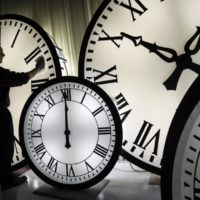The early morning of the 30th October saw the end of British Summer Time as the UK reverted to Greenwich Mean Time. It may be an inconvenience for the many users of clocks and watches, but it will prove to be a boon for many of us who have a late night on Saturday evening.
Daylight Saving Time was first proposed in 1895 by the english born New Zealander George Vernon Hudson entomologist and astronomer. It was first introduced in a number of countries including Britain during 1916 as a measure to reduce energy usage and improve available evening light during the First World War.
The establishment of British Summer Time began with the creation of an act of Parliament. Although the onset of war forced the issue, the establishment of the measures followed a campaign by the builder William Willett.
As well as being the great-great grandfather of Chris Martin, the lead singer of rock band Coldplay, Willett is best known for proposing a system where time would be advanced by 20 minutes each week from the beginning of April with the reverse procedure happening in September. The procedure would have made the UK 1hr and 20 minutes ahead of Greenwich Meant Time for much of the summer.
Willett died in 1915 without seeing the variation of his idea come to fruition. The changing of time gradually over a period of a month, twice each year would have led to considerable extra effort for owners of watches and for those who maintained public clocks and was therefore never implemented in that form. BST made its debut on the face of British clocks and watches the 21st May 1916 and reverted to GMT on 1st October.
There have been other experiments in adjusting BST. In 1940, with Britain enveloped by the Second World War, a system of Double Summer Time was instituted. Clocks were not reset to GMT during the October and an extra hour was added in the spring of 1941. This meant that the UK was at least one hour ahead of Greenwich Time until 1947, being two hours advanced during the summer months.
The 1960’s were a time of experimentation in many areas. This spirit of exploration also passed on to the area of time. Following a period of consultation, Prime Minister Harold Wilson moved permanently one hour ahead of GMT, abolishing the seasonal change during the winter months. This method was in use between October 1968 and October 1971.
From time to time plans are suggested to return the UK to the time solutions used during the Second World War. In 2010, Prime Minister David Cameron stated he would seriously consider proposals contained in a Private Members Bill introduced by Conservative MP Rebecca Harris.
However, there is a concern about the effects the later sunrises would have on the North of Scotland. The Scottish Government remains opposed to the change. However, the Institute of Advanced Motorists have suggested that the proposal could save as many as 80 lives each year caused by car crash deaths throughout the rest of the UK.








